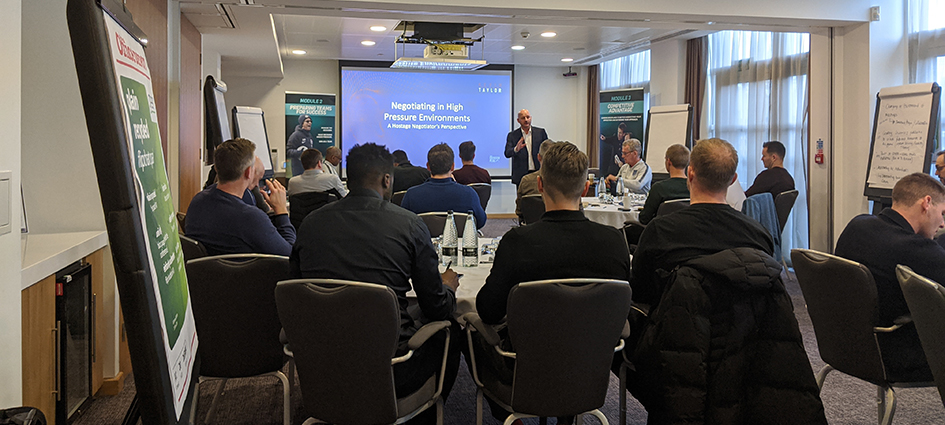
Pro Licence: communicating with confidence
- The Boot Room
- 31 January 2020
Hostage negotiation skills and acting workshops are preparing the latest cohort of managers and leaders on the UEFA Pro Licence course to communicate with confidence.
How to negotiate the successful release of a hostage is not the usual day-to-day business of a modern football manager.
However, the 25 candidates on the 2019/20 UEFA Pro Licence course recently learned about the communication skills needed to successfully keep someone alive during negotiation and the lessons that can be applied to their own environments.
Kevin Taylor, who has worked as head of the hostage negotiation team for Greater Manchester Police, delivered a workshop on ‘the art’ of listening and understanding in high-pressured environments.
The course candidates – who include Manchester United first team coach, Michael Carrick, Leicester City first team coach, Kolo Toure, and England Women’s national head coach (U18-U21s), Rehanne Skinner – were then challenged to develop their own communication and negotiation skills in a series of ‘live’ scenarios with actors.
Helping a player through mental health issues, communicating with backroom staff and dealing with racial abuse concerns were some of the situations created.
“The scenarios were really challenging but I think the good thing is that we learn [from it],” explained Touré.
“After those scenarios, you will know what to expect and how you're feeling when you're in that situation. I think it was really beneficial for all of us because we learn, and that's what's important.”
The acting and negotiating workshops were part of the ‘communicating with confidence’ block of the UEFA Pro Licence course – the highest coaching and leadership qualification offered by The FA.

Creating a positive learning environment so the candidates will communicate effectively with each other during the 18-month long course is another aim for UEFA Pro Licence lead Guy Whittingham.
“We try and develop a positive learning environment for the candidates,” explains former Portsmouth manager, Whittingham.
“We want a lot of interaction between all the coaches and all the candidates on the course. We make sure that we allow them the maximum time possible to interact and talk about whatever is on the course at the time.”
Nottingham Forest academy manager, Gary Brazil, praised the opportunity for collaboration.
“The course has taken me out my comfort zone quite a bit. It's put me in classrooms around really good lecturers, guest speakers, but also the candidates that I'm in with.
“There's a real good cross-section of people that have got different experiences in their own environments and it's good to share those as well.
“So, it's a good learning experience both with the modules that are put on by the staff, but also by the interaction with people.”
In addition to the workshops at St. George’s Park, candidates have enjoyed trips to Chelsea, Brentford and QPR as well as Harlequins rugby, the Royal College of Music and the Royal Military Academy at Sandhurst.
The visits aimed to expose the candidates to a variety of high-performance environments, challenging them to draw comparisons to their own workplace.
“The Harlequins visit was very good,” explained Manchester United’s, Carrick.
“The set up and the environment that they've created was really top drawer. It's so many things within that environment [that I liked] – the little structures, importance of player leadership and the general culture that they've created were the biggest things to take away from it.”
The Royal College of Music was a real eye opener into the dedication and hard work it takes to be at the top level of music
Exeter City manager, Matt Taylor, feels there are lot of key messages that can be applied from the visits when working with his players.
“The Royal College of Music was a real eye opener into the dedication and hard work it takes to be at the top level of music.
“To see people in little box rooms practising minute after minute, day after day, hour after hour, for what must have been years and years - and they still might not make it to the top - just really hit home how difficult it is to be successful in that field.
“If you've got a group of players, who have that in them, then you've got a better chance of being successful.”

Current managers, course alumni and external speakers – such as Google’s Kirk Vallis – have also shared their own stories with candidates.
“Meeting five or six top managers, listening to their journey on how they've come through the system and their pathway has been a fantastic learning curve for me,” says John Eustace, assistant manager at QPR.
“Dean Smith, Nathan Jones, Gareth Southgate [all who have spoken on the course] – have all had ups and downs and have talked about how they've come through and what they've taken from it.”
Between blocks candidates are provided with in-situ support from tutors in their club environment. The aim is to help embed the learning and development between the course delivery.
“One of our strongest points within The FA now, and not just on the Pro Licence but on other courses, is in-situ support,” explains Whittingham.
“Our staff are able to go into the club with the candidate and discuss what they're doing and how they’re getting on. Seeing the coach in their own environment really helps you understand them and for them to get to know you better as a tutor.”

To learn more about the Pro Licence course, click here.






